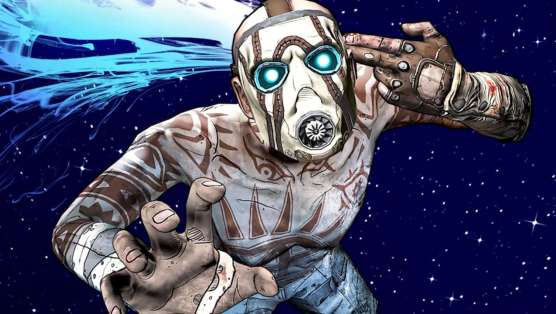Borderlands: The Pre-Sequel: Death and Comedy

As the old saw goes: “dying is easy; comedy is hard.” If you’ve ever tried to be funny, you know this is accurate. It’s incredibly easy to aim for “hilarious” and end up plummeting into the abyss of a booing audience instead. Thus the fact that most games do not try to be primarily comedic doesn’t seem strange. Injecting comedy here and there is one thing, but hanging your entire effort on being funny takes moxie. Or, in the case of the Borderlands series, it takes Moxxi.
Borderlands: the Pre-Sequel is the third game in Gearbox Software’s now-famous “shlooter” series. If you’ve never played a Borderlands game, the concept is relatively simple: take the core gameplay loop of, say, Diablo, shift it into first person perspective, add a lot—a LOT—of guns, and set it in Mad Max Beyond Thunderdome. Taking place in the five year gap between Borderlands and Borderlands 2, Pre-Sequel tells the story of how Borderlands 2’s love-to-hate-him villain, Handsome Jack, rose to power in the Hyperion Corporation and effectively set events for that game in motion. Instead of Pandora, the deep space/Wild West anarchic wasteland where the rest of the series took place, Pre-Sequel is set primarily on Pandora’s moon, Elpis.
The newest title very pointedly isn’t “Borderlands 3,” and there’s probably a good reason for that: the gameplay is certainly refined and expanded in ways compared to Borderlands 2, but for the most part remains the same. There are some new additions that add small, interesting quirks—four new character classes and a handful of new options for the combat system—but in general, Pre-Sequel delivers an experience on par with its immediate predecessor.
Lest this be read as invective: this isn’t a bad thing. Elpis is full of new assets and locations that make it feel like a genuinely new and interesting place, one that presumably reflects a few of the sensibilities of the developers at 2K Australia. If Pandora is effectively Space Texas, then Elpis is undeniably Space Alice Springs. One of the more clever background jokes of the game is the new “Oxygen Kit” item that lets you breathe and float in the mostly vacuum spaces on the moon; the game’s NPCs call these “OZ Kits.” An early-game found memo reveals this was the result of a printing error by an in-game corporation’s marketing department (“O2” rendered as “OZ”). That sort of small but hilarious touch is the Borderlands series’ stock in trade, and Pre-Sequel delivers these equally well. The recurring comedy beats that punctuate the otherwise standard (and sometimes repetitive) dealing of indiscriminate death to a progression of faceless, screaming mooks and beasties are the prime motivator of Pre-Sequel as a single-player experience, a motivator the game consistently delivers.
Being funny in this sort of work is often about managing expectation, and this is something that Pre-Sequel does effectively. A good comedy writer knows that breaking our expectations of what might happen is funny, but also that confirming our expectations can be equally funny. The humor of Borderlands often toys with this push-pull tension of expected and unexpected. While I don’t want to go into too much detail—this is an event best experienced yourself—a favorite example of this is a quest to perform a low-gravity basketball dunk. Elpis is full of the now-abandoned remains of former corporate interests, just like Pandora, so such a facility having a basketball court isn’t exactly unbelievable. That there might be random individuals out there evoking the movie Space Jam who will reward you with armaments for making an epic dunk? Slightly less so, and that’s not even taking into account what happens to the other guy who tries it.
The list of such jokes and situations that made me actually laugh out loud is long and varied. A rocket scientist and amateur classical musician whose plans to blanket Elpis in his work are explosively derailed by unexpected pirate dubstep; a talking shotgun with an aggressive personality and a woman’s Australian-accented voice dropping bleeped-out curse words with every pull of the trigger (winner here: “you’re f**king dead, you ugg boot!”); a riff on British colonialism where a deluded astronaut who has “discovered” Elpis and is now raising his country’s flag to claim it needs to be defended from local bandits who just want him to go home. I could go on and on, but in a way I feel like even listing these few favorite moments is a spoiler-y disservice to potential players.
Compared to Borderlands 2, there’s also a few positive changes in terms of the comedic and narrative content. For starters, your chosen character is no longer a “silent protagonist;” in previous Borderlands games your character had a wide range of combat barks and reactions but never spoke in story scenes. In Pre-Sequel your character has a personality of their own and will respond to other characters during story missions. As a design decision the silent protagonist seems like it’s built to let players put more of themselves in the characters they’re playing, but this was never really the case in Borderlands, so letting these characters be more “themselves” is refreshing. There are still some seams showing in the script, with NPC responses obviously written to accommodate four very different sets of text from each playable character, but these are minor.
-

-

-

-

-

-

-

-

-

-

-

-

-

-

-

-

-

-

-

-

-

-

-

-

-

-

-

-

-

-

-

-

-

-

-

-

-

-

-

-









































